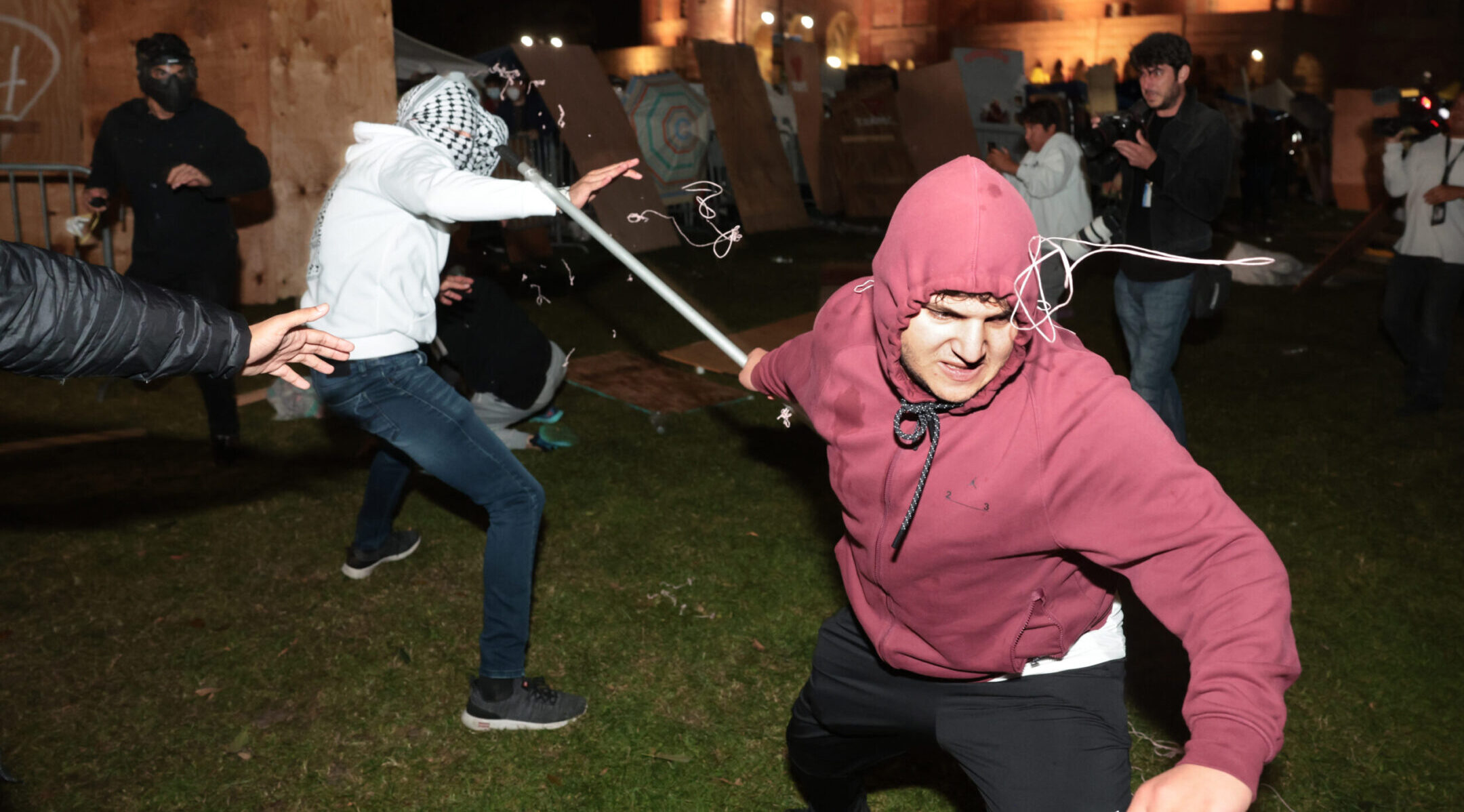(JTA) — The union representing workers at the University of California system has voted to authorize a strike over the system’s handling of pro-Palestinian protests on its 10 campuses.
The majority vote Wednesday by the UC union, which represents 48,000 academic student employees and researchers, does not mean that the union will actually strike. Still, the vote is the first by any labor union over Israel-related matters since the outbreak of the war in Gaza.
The vote came amid activist calls to divest from Israel at the UC system’s Board of Regents meeting this week. It also came days after UC Berkeley’s encampment, like several others across the country, dismantled in exchange for administrators agreeing to explore divestment options — an example of recent dealmaking that has been harshly criticized by some Jewish groups for imposing no consequences on protesters who contributed to what they call a hostile environment for Jewish students.
(Also this week, the president of Sonoma State University — part of the separate California State University system — was placed on leave less than 24 hours after agreeing to protester demands to boycott and divest from Israeli institutions.)
But the UC union president connected their vote to a different issue: the right to protest.
“At the heart of this is our right to free speech and peaceful protest,” union president Rafael Jaime, a doctoral student at UCLA, said in a statement to media outlets. “If members of the academic community are maced and beaten down for peacefully demonstrating on this issue, our ability to speak up on all issues is threatened.”
The UC union said it was also heavily motivated by UCLA’s failure to stop a clash between its pro-Palestinian encampment and violent pro-Israel counterprotesters last month; it had previously filed an unfair labor practice charge against the school over the episode. Police interventions to clear encampments at other UC campuses were another factor, the union said; also on Wednesday, police were clearing out one such encampment at UC Irvine, arresting 50 including some faculty members, after protesters there occupied a campus building.

Pro-Palestinian and pro-Israel protesters clash during violence at an encampment at UCLA early in the morning of May 1, 2024. (Wally Skalij/Los Angeles Times via Getty Images)
Labor unions, including ones representing educators in California and beyond, have sounded off on the Israeli-Palestinian conflict in the past, and some have called for Israel boycotts. But union advocates celebrated the UC union’s vote as an important step forward in both pro-Palestinian activism and the labor movement.
“Obstinate institutions can resist protests, and call out the police to disperse them, but that resistance is less effective against strikes, for the simple reason that the strikers are also the workers who make the very same institutions run,” the writer Hamilton Nolan noted in the pro-labor publication In These Times this week in advance of the vote. He added, “The universe has teed up a beautiful opportunity to demonstrate the way that organized labor power can be used to accomplish broader political goals.”
The university system warned against the prospect of a strike over what it described as “nonlabor-related disputes,” which would be illegal. A spokesperson for the president’s office told the New York Times that a strike would set a “dangerous precedent.”
The union says its concerns are rooted in employment issues, arguing that its members had faced “unprecedented acts of intimidation and retaliation directed at our rights as academic employees to free speech, protest, and collective action.” But the union has also been lobbying the UC administration to “substantively engage with the concerns raised by the protesters — which focus on UC’s investments in companies and industries profiting off of the suffering in Gaza” and has backed the protesters’ demands.
Among its other demands, the union has called on UC to grant amnesty to all disciplined or arrested student and staff protesters; disclose all its sources of funding; and “empower researchers to opt out from funding sources tied to the military or oppression of Palestinians.“
The vote to authorize a strike passed with 79% support, union representatives said; around 41% of the union voted. It grants the union’s executive board, which is affiliated with the United Auto Workers, the ability to call a strike at any time. Union leaders said the union was exploring the prospect of “stand-up strikes” targeting specific campuses, similar to the successful UAW auto-workers’ strikes earlier this year.
The strike vote was one of several acts of disruption seemingly timed to the UC Regents’ meeting this week. In Oakland, anarchists released hundreds of cockroaches inside a UC building, saying they were “showing solidarity with the Palestinian Resistance.” And immediately after Berkeley activists took down their encampment, having secured an agreement from the school’s chancellor to create a task force to explore new ethical investment strategies, many formed a new encampment at the site of the Regents’ meeting in Merced.
There, the UC system’s chief investments officer placed a dollar amount on what he said would be the cost of the university fully acquiescing to protesters’ divestment demands. The price tag would come to $32 billion of the system’s total $175 billion portfolio, or more than 18% of its total, according to Jagdeep Singh Bachher. The tally reflected student demands to divest from companies like Coca-Cola and Disney alongside disentangling from weapons manufacturers.
During the Regents’ investments committee meeting Tuesday, Bachher responded to protester queries that the school should “divest from any company or anyone that is supporting Israel” by saying, “The answer to that question is the U.S. government.” Dozens of speakers during the meeting’s multiple public comment periods also called on UC to divest from Israel.
“I appreciate that we’re bringing up the topic of divestment with everything that’s been happening on the campuses,” Merhawi Tesfai, a UCLA graduate student and regent, told Bachher during the meeting. He later added, “Our campus communities are the early warning sign. This is something that’s a national topic…. We can’t ignore the issue, and we can’t just not respond to it.”

